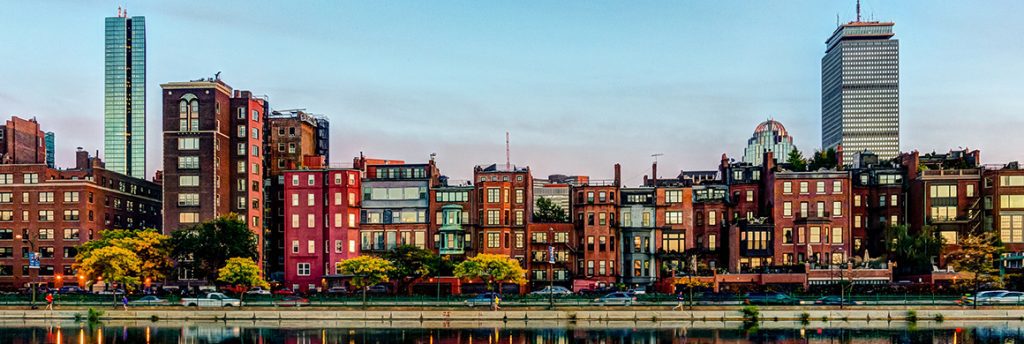Anyone planning on earning a postgraduate business degree knows that MBA programs cost a lot of money. In the Boston metro, where the cost of living is already high, the annual cost of an MBA program can reach upward of $100,000 … Ouch!
Thankfully, business schools recognize that money shouldn’t be a barrier to entry for students seeking higher education. Below are just a few of the opportunities the Boston business schools provide for low-income students to pay for their MBA, ensuring that talented business students can attend their school regardless of finances.
Finding an Affordable Program
As we mentioned above, living in Boston isn’t cheap. According to Expatistan Cost of Living Index, Boston is the sixth most expensive city in North America. On average, rents costs between $1,641 (480 sq. ft.) and $2,812 (900 sq. ft.) per month, depending on location. Add in utilities, food, transportation, personal care and entertainment, and living, studying and working in Bostons ends up costing a ton.
Luckily, there are affordable MBA options in the Boston metro that make it easier for low-income students to attend business school. For example, the tuition cost per semester for Boston College’s Carroll School of Management’s full-time MBA is $22,760, meaning the total academic year cost to just $45,520. That’s a great return on investment when you figure that the average compensation for the Class of 2015 was $103,226.
Another affordable full-time MBA option in Boston is D’Amore-McKim’s program. The estimated total tuition, fees and other expenses for all 60 credits of the full-time MBA over two years is $99,626—a figure that includes books and supplies, university fees and program fees. Check out our complete guide to most affordable MBA programs in Boston for more information.
Loan Options
Another way for low-income students to pay for their MBA is through loans. After being admitted to business school, students should file a Free Application for Federal Student Aid (FAFSA) and Graduate Loan Application at their school, which will help determine their eligibility for federal and private loans by working alongside their school’s Financial Services department. Sure loans, and the student debt that follows, aren’t ideal, but MBA degrees and the career doors they open generally carry high returns on investment.
YOU MIGHT ALSO LIKE: Boston’s Essential Nonprofit MBA Programs
Scholarships/Fellowships
Boston area business schools also offer scholarships and fellowships to students. These funds are awarded to student who meet certain criteria, whether financial, racial, or merit-based.
A number of scholarships are available to both domestic and international full-time students at the aforementioned Carroll School of Management. Candidates are automatically considered for these scholarships at the time of application, so there aren’t any unnecessary forms. In 2015, more than 75 percent of newly enrolled students received a merit-based awards, averaging $44,000 in value. Meanwhile, students of Irish descent may qualify for a full-ride through the Denis O’Brien Fellowship.
All students admitted to the Northeastern University D’Amore-McKim School of Business are automatically considered for a scholarship based on undergraduate record, professional experience, recommendations, GMAT score and other relevant application materials. These scholarships range from 25 percent to full tuition.
The F.W. Olin Graduate School of Business at Babson College offers merit and donor scholarships, assistantships, and fellowships to both domestic and international applicants to the full-time program. These scholarships are awarded to candidates at the time of admission.
Harvard Business School offers need-based fellowships to low-income students—about half of students admitted are eligible for a need-based fellowship. HBS does not offer merit-based scholarships, but encourages students to look into scholarship opportunities through the university or outside sources.
The admissions committee at the Boston University Questrom School of Business automatically considers students for merit scholarships based on an applicant’s academic, professional, and extracurricular track record. There’s a good chance an applicant will qualify for some form of aid, with more than 90 percent of students received financial assistance through the school. The average scholarship awarded to students typically amounts to $25,000.
Students admitted to Sawyer Business School’s full-time and part-time MBA programs do not need to submit additional materials to be considered for merit-based fellowships and scholarships. These awards are based on a candidate’s undergraduate academic record and GMAT or GRE scores.
The MIT Sloan School of Management offers a number of competitive fellowships/scholarship to incoming and second-year MBA students each year. However, these scholarships are merit-based rather than need-based. All admitted students to MIT will be considered for fellowships that they are eligible for, and do not require a separate application, except for the Legatum Fellowship and the MIT Public Service Center Fellowships. Fellowships may range in support from $10,000 to full tuition coverage. You can find more information about the variety of fellowships offered at MIT Sloan here.
Assistantships
Once admitted, students looking for additional financial aid should look into becoming a teaching or research assistant. TAs are usually tasked with grading assignments and exams, working directly with students, or assisting with research. Not only are students paid for their time, they gain important experience and exposure to their university’s research and education programs.
For more information, check out our list of Best Boston MBA Programs For Your Buck.
